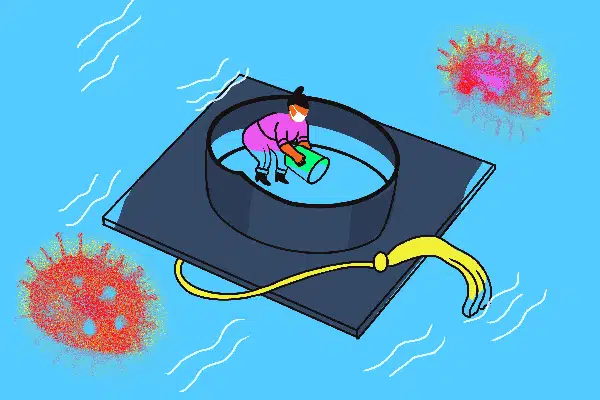Most Student Loans Are Suspended Right Now. Should You Pay Anyway?

Welcome to Dollar Scholar, a personal finance newsletter written by a 28-year-old who’s still figuring it out: me.
Every week, I talk to experts about a money question I have, whether that’s “What if I don't have a 401(k)? or “How many credit cards do I need?” As I learn, I share simple ways to improve your financial life… and post cute dog photos.
This is (part of) the 40th issue. Check it out below, then subscribe to get future editions of Dollar Scholar every Wednesday.
Confession time: I can be a pretty annoying person to be around. As you know all too well, I talk almost constantly about the Jonas Brothers. I only use Bitmoji ironically. I say “YOLO” too often. I’m overly competitive while playing board games, I’m a picky eater, and I’m ruthless when it comes to judging other people’s Instagram photos.
That’s not to say I don’t have good qualities! I’m great at proofreading, for example, and surfacing funny TikTok videos. I bake a mean apple pie. But perhaps the biggest value I bring as a friend is that I’m the Dollar Scholar, and therefore I can answer pressing money questions.
Or, at least, I can politely ask experts to do it. 😇
The reason I’m telling you all of this is that I personally don’t have student debt, but my friends do. One of them asked me recently how they should handle their student loan payments during These Uncertain Times — and I feel it’s my duty to give my BFF some advice. And you, dear readers.
So, should my friends (and Scholars) put off paying student loans during the coronavirus crisis? Let’s find out.
First, I learned this isn’t just an issue among my pals. It’s lucky (and rare) that I don’t have student loans. As of last year, Americans owed $1.41 trillion — that’s trillion with a “t” — in student debt. Two out of every three graduating seniors in 2018 had loans, with the average load coming in at $29,200. Yikes.
Payments are a pretty big burden to shoulder even when there’s not a pandemic happening. Fortunately, politicians seem to be aware of this. One of the first things the government did when it started responding to this whole crisis was waive interest on federal student loans. Then it said some borrowers could suspend payments for two months. And THEN it stopped some payments for six months.
I called Betsy Mayotte, the president and founder of The Institute of Student Loan Advisors, to ask what I should make of this. She told me that it depends.
“Not all student loans and not all federal loans are eligible for the same waivers,” Mayotte says. “Whichever waivers you’re eligible for changes the answer to your question.”
The CARES Act put all payments on federally held student loans on hold through Sept. 30. Borrowers in this category automatically got placed into administrative forbearance dating back to March 13. They’re not required to pay, and their loans have a 0% interest rate.
This potentially sets up a sweet deal if I can afford to make my regular payments on student loans. Assuming I don’t have unpaid interest from before the coronavirus outbreak, they’ll go directly toward the principal. Also, once interest starts accruing again, it’ll be based on a reduced sum.
“You’re going to save money on interest in the long run,” Mayotte says.
But if I’m in this group — the one where my loans do indeed qualify and I’m comfortable enough to consider making payments — Mayotte told me to look at my overall financial situation before making a decision. If I need every cent I can get for essentials or I’m worried about my job, it may be smart to take advantage of this student loan forbearance period. I could pay down higher-interest debt or redirect the cash elsewhere.
“We don’t know how long the economic effects of this pandemic are going to last — I certainly think beyond September,” Mayotte says. “I would recommend people kick up their emergency fund money to be as robust as possible.”
There’s also nothing preventing me from walking the line and doing both. I could skip monthly payments for now, and if I have a financially solid summer, I could just make a big payment right before the forbearance period ends on Sept. 30. It’d still go toward my principal and reduce the total that interest accrues upon.
Clearly, this is complicated AF. And it all comes with caveats.
There are different circumstances around Public Service Loan Forgiveness, for instance. Plus, remember that not all student loans qualify for the CARES Act forbearance. If my loan is private or only federally guaranteed, the rules are different.
The general takeaway is that if I need help or I’m confused, I have options. I can call my servicer or check out resources like studentaidpandemic.org to learn about lower payments, disaster forbearance and unemployment deferment.
Bottom line: If my loans qualify for the automatic six-month forbearance and I have a large emergency fund, it’s not a bad idea to tackle my principal. But that’s a big — and nuanced — “if.”
“The best high-level advice is to contact your loan holder if you’re struggling,” Mayotte says.
More from Money:
Student Loans and the CARES Act: Here's How Coronavirus Relief Will Actually Work
